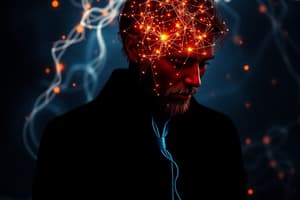Podcast
Questions and Answers
What is the primary focus of Adlerian psychology, according to the text?
What is the primary focus of Adlerian psychology, according to the text?
- Exploring philosophical concepts through the lens of psychological theories.
- Providing simple, concrete answers on how to achieve happiness. (correct)
- Understanding the complexities of the unconscious mind.
- Analyzing early childhood trauma to understand adult behavior.
Why does the young man find the philosopher's views so objectionable?
Why does the young man find the philosopher's views so objectionable?
- He struggles with feelings of inferiority and finds it difficult to accept the philosopher's optimistic outlook. (correct)
- He is skeptical of any philosophical system that claims to offer definitive answers to life's questions.
- He believes the philosopher is too focused on abstract concepts instead of practical solutions.
- He is a staunch follower of Freudian psychology and disagrees with Adler's theories.
What caused the philosopher to take on a disciple, despite never doing so before?
What caused the philosopher to take on a disciple, despite never doing so before?
- The recognition of a potential student who is ready to understand a different perspective. (correct)
- A reevaluation of his life's work brought about by his study of Adlerian psychology.
- A need to pass on his knowledge of Greek philosophy before he dies.
- A desire to have someone to debate about the merits of different philosophical schools.
How does the philosopher describe Alfred Adler's contribution to psychology?
How does the philosopher describe Alfred Adler's contribution to psychology?
What field of study is the philosopher primarily engaged in?
What field of study is the philosopher primarily engaged in?
What is the significance of the phrase "Let's deny psychological trauma" in the context of the book?
What is the significance of the phrase "Let's deny psychological trauma" in the context of the book?
What is a central characteristic of the young man?
What is a central characteristic of the young man?
What is the role of the dialogue between the young man and the philosopher?
What is the role of the dialogue between the young man and the philosopher?
According to the philosopher, what is the primary reason the young man yelled at the waiter?
According to the philosopher, what is the primary reason the young man yelled at the waiter?
How does the text portray Adler's contribution to the field of psychology in comparison to Freud and Jung?
How does the text portray Adler's contribution to the field of psychology in comparison to Freud and Jung?
How does the philosopher refute the young man's claim that his anger was the 'cause' of his outburst?
How does the philosopher refute the young man's claim that his anger was the 'cause' of his outburst?
What might be inferred about the relationship between philosophy and psychology based on the philosopher's interest in Adler's work?
What might be inferred about the relationship between philosophy and psychology based on the philosopher's interest in Adler's work?
What is the core argument of the philosopher regarding the concept of fabricated emotions?
What is the core argument of the philosopher regarding the concept of fabricated emotions?
How does the philosopher's perspective challenge the conventional understanding of emotions?
How does the philosopher's perspective challenge the conventional understanding of emotions?
What central philosophical concept is being explored in the dialogue between the young man and the philosopher?
What central philosophical concept is being explored in the dialogue between the young man and the philosopher?
How does the philosopher likely view the role of 'purpose' in human behavior, based on the discussion?
How does the philosopher likely view the role of 'purpose' in human behavior, based on the discussion?
If the young man truly fabricated his anger, what does this suggest about his awareness of his own motivations?
If the young man truly fabricated his anger, what does this suggest about his awareness of his own motivations?
What would be the most likely counter-argument the young man would use to defend his position?
What would be the most likely counter-argument the young man would use to defend his position?
Why does the philosopher steer the conversation away from the young man's friend initially?
Why does the philosopher steer the conversation away from the young man's friend initially?
How does the dialogue contribute to a broader understanding of human psychology?
How does the dialogue contribute to a broader understanding of human psychology?
What is the core idea behind the philosopher's discussion of his height?
What is the core idea behind the philosopher's discussion of his height?
According to the philosopher, what distinguishes a subjective feeling of inferiority from an objective one?
According to the philosopher, what distinguishes a subjective feeling of inferiority from an objective one?
The philosopher's friend says, 'You have a way of putting people at ease.' How does the philosopher use this statement to challenge his feelings about his height?
The philosopher's friend says, 'You have a way of putting people at ease.' How does the philosopher use this statement to challenge his feelings about his height?
What does the philosopher suggest about changing one's perspective on a perceived shortcoming?
What does the philosopher suggest about changing one's perspective on a perceived shortcoming?
How does the concept of 'choosing a new lifestyle' relate to the philosopher's idea of subjective perspective?
How does the concept of 'choosing a new lifestyle' relate to the philosopher's idea of subjective perspective?
How does the passage use 'water at 18 degrees C' as a metaphor?
How does the passage use 'water at 18 degrees C' as a metaphor?
What is the significance of revisiting the meaning of 'inferiority complex' in German?
What is the significance of revisiting the meaning of 'inferiority complex' in German?
According to the philosopher, what is the relationship between objective facts and subjective thoughts?
According to the philosopher, what is the relationship between objective facts and subjective thoughts?
What is the philosopher trying to convey by comparing the value of self-worth to commodities like diamonds?
What is the philosopher trying to convey by comparing the value of self-worth to commodities like diamonds?
How does the philosopher's discussion of height challenge the common understanding of 'inferiority'?
How does the philosopher's discussion of height challenge the common understanding of 'inferiority'?
According to the philosopher, what is the crucial determinant of our present state, irrespective of past occurrences?
According to the philosopher, what is the crucial determinant of our present state, irrespective of past occurrences?
The philosopher argues against the notion that humans are primarily driven by emotions. What is the core of his argument?
The philosopher argues against the notion that humans are primarily driven by emotions. What is the core of his argument?
How does the philosopher contrast Adlerian psychology with nihilism, particularly regarding the influence of emotions and the past?
How does the philosopher contrast Adlerian psychology with nihilism, particularly regarding the influence of emotions and the past?
What potential consequence does the philosopher attribute to adhering strictly to the 'cause-and-effect' theory regarding past events?
What potential consequence does the philosopher attribute to adhering strictly to the 'cause-and-effect' theory regarding past events?
The philosopher uses the analogy of 'well water being 18 degrees' in relation to a person's past. What does this analogy aim to illustrate?
The philosopher uses the analogy of 'well water being 18 degrees' in relation to a person's past. What does this analogy aim to illustrate?
According to the philosopher, what is the significance of embracing the premise that 'people can change'?
According to the philosopher, what is the significance of embracing the premise that 'people can change'?
What does the philosopher imply by stating that denying free will and viewing humans as machines aligns with Freud's cause-and-effect theory?
What does the philosopher imply by stating that denying free will and viewing humans as machines aligns with Freud's cause-and-effect theory?
What is the philosopher's main critique of Freud's theory of trauma?
What is the philosopher's main critique of Freud's theory of trauma?
How does adopting a perspective that emphasizes purpose rather than cause change one's outlook on life?
How does adopting a perspective that emphasizes purpose rather than cause change one's outlook on life?
What is the primary reason the aspiring novelist avoids submitting their work, according to the philosopher?
What is the primary reason the aspiring novelist avoids submitting their work, according to the philosopher?
The philosopher states, 'We do not act because we are controlled by emotions.' What does this imply about human agency?
The philosopher states, 'We do not act because we are controlled by emotions.' What does this imply about human agency?
What is the philosopher's advice to overcome the tendency to make excuses and avoid action?
What is the philosopher's advice to overcome the tendency to make excuses and avoid action?
Why does the youth believe that accumulating knowledge, like the philosopher does, won't change his fundamental nature?
Why does the youth believe that accumulating knowledge, like the philosopher does, won't change his fundamental nature?
According to the philosopher, what is the first and foremost thing one needs to do if they want to change their lifestyle?
According to the philosopher, what is the first and foremost thing one needs to do if they want to change their lifestyle?
What does the philosopher suggest is the function of using 'if' statements (e.g., 'If I were like Y, I would be happy')?
What does the philosopher suggest is the function of using 'if' statements (e.g., 'If I were like Y, I would be happy')?
What is the philosopher's primary concern when questioning the youth's desire to become like 'Y'?
What is the philosopher's primary concern when questioning the youth's desire to become like 'Y'?
What is the philosopher's view on facing failure, such as a writer's manuscript being rejected?
What is the philosopher's view on facing failure, such as a writer's manuscript being rejected?
Which statement best captures the philosopher's interpretation of the youth's desire to become like 'Y'?
Which statement best captures the philosopher's interpretation of the youth's desire to become like 'Y'?
What does the philosopher mean when he says that someone makes their life 'complicated'?
What does the philosopher mean when he says that someone makes their life 'complicated'?
The youth frequently references differences in 'temperament' or 'character.' How does the philosopher seem to regard these claims?
The youth frequently references differences in 'temperament' or 'character.' How does the philosopher seem to regard these claims?
What does the philosopher suggest one must change to alter their perception of the world and themselves?
What does the philosopher suggest one must change to alter their perception of the world and themselves?
What is the significance of the philosopher and the youth engaging in a Socratic or Adlerian-style dialogue?
What is the significance of the philosopher and the youth engaging in a Socratic or Adlerian-style dialogue?
According to the conversation, what is the youth's current emotional state?
According to the conversation, what is the youth's current emotional state?
What is the ultimate message that the philosopher wants to deliver to the young man?
What is the ultimate message that the philosopher wants to deliver to the young man?
What is the philosopher's perspective on the relationship between personal change and external factors?
What is the philosopher's perspective on the relationship between personal change and external factors?
How does the philosopher challenge the youth's assertion that accumulating knowledge will not change his character?
How does the philosopher challenge the youth's assertion that accumulating knowledge will not change his character?
In the context of the discussion, what does 'lối sống' (lifestyle) encompass?
In the context of the discussion, what does 'lối sống' (lifestyle) encompass?
The youth mentions that even if he accumulates knowledge of Adler's theories, his personality will not change. What core concept from the text relates to this statement?
The youth mentions that even if he accumulates knowledge of Adler's theories, his personality will not change. What core concept from the text relates to this statement?
The Philosopher challenges this statement from the Youth: 'I would be happy if only I were like Y.' Which of the following is the most likely reason for his challenge?
The Philosopher challenges this statement from the Youth: 'I would be happy if only I were like Y.' Which of the following is the most likely reason for his challenge?
The youth describes himself as someone who will revert to his original state despite accumulating knowledge. What does this imply about his belief in self-improvement?
The youth describes himself as someone who will revert to his original state despite accumulating knowledge. What does this imply about his belief in self-improvement?
Flashcards
Alfred Adler
Alfred Adler
A prominent psychologist, known for founding Adlerian psychology in the early 20th century.
Adlerian psychology
Adlerian psychology
A psychological framework emphasizing individual purpose and social interest, founded by Alfred Adler.
Philosophy of life
Philosophy of life
A set of beliefs or principles that guide how one lives and understands existence.
Self-doubt
Self-doubt
Signup and view all the flashcards
Inferiority complex
Inferiority complex
Signup and view all the flashcards
Philosopher's dialogue
Philosopher's dialogue
Signup and view all the flashcards
Cultural support
Cultural support
Signup and view all the flashcards
Perception of happiness
Perception of happiness
Signup and view all the flashcards
Trusting others
Trusting others
Signup and view all the flashcards
Greek philosophy
Greek philosophy
Signup and view all the flashcards
Viktor Frankl
Viktor Frankl
Signup and view all the flashcards
Nihilism
Nihilism
Signup and view all the flashcards
Causation vs. Teleology
Causation vs. Teleology
Signup and view all the flashcards
Subjective Experience
Subjective Experience
Signup and view all the flashcards
Objective Event
Objective Event
Signup and view all the flashcards
Free Will
Free Will
Signup and view all the flashcards
Psychological Trauma
Psychological Trauma
Signup and view all the flashcards
Meaning-making
Meaning-making
Signup and view all the flashcards
Existential Philosophy
Existential Philosophy
Signup and view all the flashcards
Dialogical Method
Dialogical Method
Signup and view all the flashcards
Character vs. Knowledge
Character vs. Knowledge
Signup and view all the flashcards
Adler's Philosophy
Adler's Philosophy
Signup and view all the flashcards
Purpose of Change
Purpose of Change
Signup and view all the flashcards
Self-Love
Self-Love
Signup and view all the flashcards
Influence of Environment
Influence of Environment
Signup and view all the flashcards
Innate Traits
Innate Traits
Signup and view all the flashcards
Happiness Connection
Happiness Connection
Signup and view all the flashcards
Philosophical Inquiry
Philosophical Inquiry
Signup and view all the flashcards
Personal Growth
Personal Growth
Signup and view all the flashcards
Deciding to Change
Deciding to Change
Signup and view all the flashcards
Excuses for Inaction
Excuses for Inaction
Signup and view all the flashcards
The Writer's Dilemma
The Writer's Dilemma
Signup and view all the flashcards
Potential vs. Reality
Potential vs. Reality
Signup and view all the flashcards
Fear of Failure
Fear of Failure
Signup and view all the flashcards
Change in Perspective
Change in Perspective
Signup and view all the flashcards
Taking Risks
Taking Risks
Signup and view all the flashcards
Complex Life
Complex Life
Signup and view all the flashcards
Engagement in Action
Engagement in Action
Signup and view all the flashcards
Revising Life Choices
Revising Life Choices
Signup and view all the flashcards
Purpose Theory
Purpose Theory
Signup and view all the flashcards
Emotional Control
Emotional Control
Signup and view all the flashcards
Outburst
Outburst
Signup and view all the flashcards
Emotional Influence
Emotional Influence
Signup and view all the flashcards
Intentional Anger
Intentional Anger
Signup and view all the flashcards
Reaction vs. Action
Reaction vs. Action
Signup and view all the flashcards
Fault in Emotions
Fault in Emotions
Signup and view all the flashcards
Causal Link
Causal Link
Signup and view all the flashcards
Manipulating Emotions
Manipulating Emotions
Signup and view all the flashcards
Philosophical Debate
Philosophical Debate
Signup and view all the flashcards
Subjective Inferiority
Subjective Inferiority
Signup and view all the flashcards
Objective Measurement
Objective Measurement
Signup and view all the flashcards
Value Assignment
Value Assignment
Signup and view all the flashcards
Social Comparison
Social Comparison
Signup and view all the flashcards
Self-Perception
Self-Perception
Signup and view all the flashcards
Interpersonal Relationships
Interpersonal Relationships
Signup and view all the flashcards
Cognitive Choice
Cognitive Choice
Signup and view all the flashcards
Self-Acceptance
Self-Acceptance
Signup and view all the flashcards
Intrinsic Value
Intrinsic Value
Signup and view all the flashcards
Study Notes
Book Title: Dám bị ghét
- International bestseller by Kishimiichiro and Koga Fumitake
- Translated by Nguyễn Thanh Văn
- Over 3 million copies sold in Japan
- A book about overcoming psychological trauma
- Discusses how past trauma and interpersonal relationships influence current struggles and the importance of moving forward
Table of Contents:
- Introduction
- Day one: Overcoming psychological trauma
- Day two: Exploring interpersonal relationship issues
- Day three: Letting go of other's expectations
- Day Four: Finding your true place in the world
- Day five: Living in the present
- Day six: Letting go of the past
- Conclusion
Studying That Suits You
Use AI to generate personalized quizzes and flashcards to suit your learning preferences.




